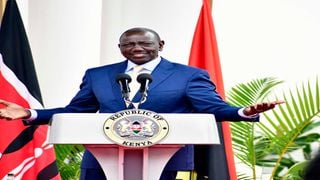
President William Ruto makes his remarks at State House, Nairobi on October 21, 2023 when he hosted President Joao Lourenco of Angola.
| Francis Nderitu | Nation Media GroupNews
Premium
Ruto’s ‘Haiti moment’ as he faces MPs today
President William Ruto is expected to deliver his maiden State of the Nation Address on Thursday, outlining his administration's plan to deliver on campaign promises and measures aimed at cementing his legacy.
According to a gazette notice published last week, the President will address a joint sitting of the National Assembly and Senate on November 9, 2023.
The last State of the Nation address was delivered by former president Uhuru Kenyatta on November 30, 2021, months before the general election in which Ruto won the presidential race and was sworn in on September 13, 2022.
The Speakers of the two Houses, Moses Wetang’ula (National Assembly) and Amason Kingi (Senate), have therefore called on all members of the two parliamentary institutions to attend at 2.30pm.
The Head of State is expected to address Kenya's move to contribute its police officers to a mooted security mission to Haiti, which is facing legal challenges, including from some of the country's top legal minds, and even with some of the ruling Kenya Kwanza MPs expressing reservations about the plan to send 1,000 police officers to Haiti.
On Tuesday, during a Parliamentary Group meeting at State House, lawmakers, particularly from the Rift Valley, are said to have cited local security challenges in parts of the country, which they said would be deprived of personnel in the event of such a deployment.
They told the President that the deployment could compromise the country's internal security. The MPs cited security challenges in Baringo, Lamu and other parts of the country.
The multinational force of 1,000 Kenyan police officers is expected to spend a year fighting criminal gangs responsible for a wave of killings, kidnappings and rapes.
In October, President Ruto welcomed the UN Security Council resolution to send a multinational force to Haiti to help fight violent gangs.
His comments came hours after the United Nations voted to send a force to the troubled Caribbean nation for the first time in almost 20 years, where gang violence has escalated dramatically.
Ruto said the Kenya-led force “will provide a different footprint in the history of international intervention in Haiti.”
“We shall succeed in Haiti,” Ruto said. “We must not fail the people of Haiti.”
The resolution, drafted by the United States and Ecuador, authorises the deployment of the force for one year, with a review after nine months. The non-UN mission would be funded by voluntary contributions, with the US pledging up to $200 million.
Amnesty International Kenya has also called on UN member states, human rights organisations and citizens to thoroughly examine the "human rights and humanitarian implications" of sending an armed multinational force to Haiti.
Kenya's police have often been criticised for their use of force to contain demonstrations. Dozens of civilians were killed during anti-government protests in the East African country in July this year.
The UN expressed concern at the time about police brutality during the protests in Kenya, adding that up to 23 people may have been killed during the demonstrations.
The Kenya National Civil Society Centre has also opposed the deployment of the country's police to Haiti, accusing them of "extrajudicial killings".
“The Kenya Police Service is notorious for its excessive use of force and continues to take the flak for the large number of extrajudicial killings and arbitrary execution of protestors during the recent anti-government protests,” the organisation said in October.
The administration of US President Joe Biden has pledged $100 million (Sh15.14 billion) to support the mission. It is not clear whether Kenya will benefit directly from the fund.
Kenya has played a major role in supporting UN peacekeeping initiatives and African Union peace missions in the past. A senior Biden administration official said Kenya had "demonstrated the capacity to lead international security missions of this type and to adhere to UN human rights and accountability standards".
The planned deployment was temporarily halted by the High Court following a petition by Ekuru Aukot's Thirdway Alliance Party.
Dr Aukot argued in the petition that Kenya's Constitution restricts police officers from operating outside Kenya's borders.
Dr Aukot has also accused the President of planning to deploy police officers outside Kenya at a time when security officers have failed to curb tribal violence in Lamu County, where he says members of one community have been targeted for death.
Kenya has also faced questions, including the fact that five previous foreign missions to Haiti failed to bring peace.
The Caribbean Community (Caricom), the regional bloc of which Haiti is a member, says Haiti's painful experience of foreign military intervention means the mission could worsen the crisis.
When Caricom first endorsed the mission in July, protests against the deployment erupted in Haiti.
The multinational security support has also been opposed by black lobbies in the US.
The Black Alliance for Peace, a rights lobby against what it calls imperialism, said Kenya's proposal amounted to "a foreign armed intervention in Haiti".
A UN-approved stabilisation mission to Haiti, which began in June 2004, was marred by a sexual abuse scandal and the introduction of cholera, which killed nearly 10,000 people. The mission ended in October 2017.





